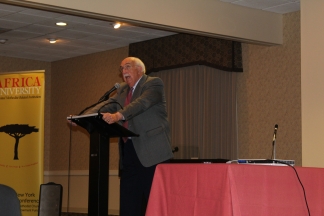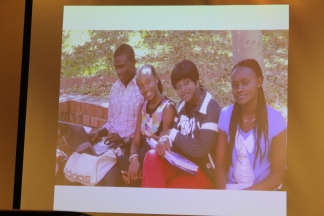news article
Africa University—what’s next?
November 28, 2016 / By Shannon Hodson / .(JavaScript must be enabled to view this email address)
Editor’s Note: On Saturday evening, November 19, Bishop J. Lawrence McCleskey was the featured speaker at a dinner at Drumlin’s Country Club in Syracuse, celebrating Africa University. Bishop McCleskey served for 45 years as an active United Methodist clergyperson, including 12 years as a bishop. Today, in his retirement, he volunteers part-time for Africa University and serves as the Executive Vice President of Development. While in Syracuse, he educated members of various UM congregations on how Africa University came about, where it is today, and where it can be in the future with the help of individuals, congregations, and Conferences.
Africa University-The history
The development of Africa University is a consequence of the growth of United Methodism in Africa. In 1980, the growth in membership and the emerging socioeconomic and political needs in their countries led the African bishops of the United Methodist Church (UMC) to call on their church to invest in higher education provision in Africa.
At the 1988 UMC General Conference in St. Louis, the General Conference unanimously approved the founding of Africa University and made a commitment to provide financial support for the University from the General Church budget, ($2.5 million annually). What this means is that Africa University became a part of the apportionments of the offerings collected at all United Methodist Churches.
On January 21, 1992, the President of the Republic of Zimbabwe, His Excellency Robert Gabriel Mugabe, issued the Africa University Charter by official proclamation, making the institution the first recognized private university in Zimbabwe. During this first year of Africa University, 40 students were enrolled.
Bishop McCleskey informed attendees at the Drumlins dinner that “The Upper New York Conference and predeceasing 
Africa University-Today
Bishop McCleskey has always been involved with Africa University and today, his commitment to Africa University is his livelihood and was his answer to the question “What are you going to do in your retirement?” As Executive Vice President of Development for Africa University, since he retired from the UMC eight years ago, Bishop McCleskey said that his life goal is to “raise friends and funds of Africa University.”
Bishop McCLeskey showed a DVD about Africa University, which revealed the extraordinary beauty of the large Africa University campus, which is on over 100 acres of land. The narrator of the DVD, stated, “This campus is a remarkable contrast to the African countries. Africa University is a place of peace, learning, and hope.”
Bishop McCleskey then shared many statistics of where Africa University is today. In 2015-2016, 12 new residence halls were built and 16 staff houses. Bishop McCleskey said, “There is no indebtedness in any of the buildings on Africa University that were built since its inception. That is because we do not build until the necessary funds are raised.”
In 2015-2016, Africa University had 1,415 students from 26 African countries. Bishop McCleskey pointed out an amazing statistic; he said “May I note that over 50 percent of the student population is female, which is remarkable in a male-dominated culture.”
Bishop McCleskey emphasized that the continued success of Africa University would not have been possible without the unceasing support of individuals, churches, and Conferences. He said, “I believe Africa University is the most significant mission of the United Methodist Church in my lifetime.”
Africa University-Tomorrow
Bishop McCleskey mentioned several ways in which United Methodists can help assure Africa University’s continued success.
One of the most unique ways of helping is through USAHWIRA (pronounced You-suh-we-rah), which means “a beautiful friendship” in Shona, the most spoken language of Zimbabwe. This is a unique scholarship program that covers a student’s four years of attendance at Africa University. An individual, local church, a group of congregations, or a District can commit to invest in four years of education for an Africa University student. The cost is $6,000 a year for four years. With this program, you are able to connect with the student you are supporting so you can intimately learn how your investment helps!
Bishop McCleskey also mentioned an endowment initiative. He said, “The development office has raised $66 million over the years from individuals, churches, and Conferences. This is money that has helped pay for the beautiful buildings on the campus, scholarships, professorships, and more. But, we’re looking at long-term sustainability, so we’ve been engaged in the silent phase of a $50 million campaign. We just announced this campaign publically in September, and we already have commitments of $26 million. We are doing this in line with celebrating Africa University’s 25th Anniversary (in 2017), and we hope with this two-and-a-half to three year campaign, we can raise $50 million, which will give us a $100 million endowment.”
Bishop McCleskey continued, “There are several ways of participating in this endowment campaign. We cultivate individual gifts or planned gifts. Planned gifts are gifts of over $10,000 or more than can be given over a period of years; they are a significant part of this ongoing campaign.”
The Rev. Ann Blair, an Upper New York pastor at Sterling UMC and Red Creek-Westbury UMC is a planned giver to Africa University, through her estate. She said, “Over the years, I have felt that part of my call to ministry - as well as my role as a parent - has been to help broaden the horizons of young people, to see beyond themselves and become more aware of God's world…In my childhood I became interested in Africa, and I have been involved with the Zimbabwe Partnership of the Wyoming Annual Conference and the AU Scholarship Task Force. As the Task Force worked together, I came to feel that support of the AU scholarship as a part of my estate planning would be an important statement of my family's values. In consultation with my daughters, Trish and Nina - who have their own interest in Maua Methodist Hospital in Kenya - I added AU to my will…In this way, I will be able to continue broadening the horizon for others.”
One of the most remarkable facts about Africa University that Bishop McCleskey shared is that despite the economic and political turmoil in Zimbabwe, Africa University has never been impacted. This is because of the way it is funded through the United Methodist Church. If you or your church is interested in learning more about how you can help Africa University, click here to visit Africa University’s Development Office website.
